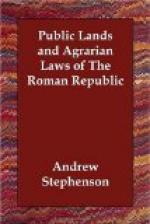The death of Caesar in no way stopped the assignment of lands, but rather rendered all possession of land in Italy unsafe. A few weeks after his death two new laws were promulgated, one by the tribune, Lucius Antonius,[1] a lex agraria, and the other the lex de colonis in agros deducendis by the consul Marcus Antonius. The first was enacted on the 5th of June,[2] and ordered that all the ager publicus still at the disposal of the state, including the Pomptine marshes which Caesar had at one time planned to drain, but had not, be divided among the veterans and citizens. It was abrogated by a senatus consultum of the 4th of January, 43,[3] but was nevertheless carried into execution almost immediately with great relentlessness towards the enemies[4] of Antonius. The second, the Lex Antonia, perished in April of 44, and had as a result the establishment of a colony near Casilinum,[5] which Caesar had already colonized; the remainder of the domain lands, the ager Campanus and ager Leontinus, was converted into a reward for the supporters of Antonius.[6] This was also set aside by the new law of the consul C. Vibius Pansa, in February, 43.[7]
Second Triumvirate. When Antony, Lepidus, and Octavius were reconciled, thus forming the second triumvirate, the treaty sanctioning this new state of affairs stipulated, in favor of the soldiers, a new distribution of lands, i.e., a new agrarian law; Appian says:—“In order to increase the zeal of the army, the triumvirs promised to the soldiers, independent[8] of other results of victory and a gratuity of colonies, 18 Italian towns, important by means of their wealth and the richness of their lands. These were divided among the soldiers with their lands and buildings, as conquered towns. Among the number were Capua, Rhegium, Venusia, Beneventum, Nuceria and Vibo. Thus the most beautiful part of Italy became the prey of the soldiers.”
Dion Cassius, Suetonius and Velleius Paterculus all mention these assignments. After the battle of Philippi and the defeat and death of Brutus and Cassius, 170,000 men were provided for, in accordance with these promises, out of the goods of the proscribed and the lands confiscated to the state. The lands of the towns mentioned in Appian were taken under the form of a forced sale, but the purchase money was never paid owing to the bankrupt condition of the treasury.
If we examine into the nature of these agrarian laws since the death of Julius Caesar, we shall find that they differ in all respects from previous enactments:
1. They were executed at the expense not only of public domains but also of private property.
2. They were the work of one man and not of the entire people.
3. The name of the people was never mentioned in these laws; they were enacted wholly for the profit of the soldiery. Before the distributions made by the triumvirate, the public lands had been absorbed, or at least the fragments remaining were in no way sufficient to recompense the service of the veterans.




